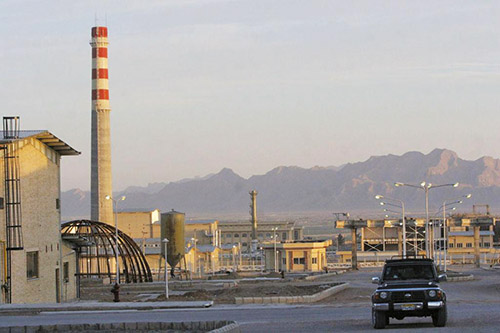
Israeli Foreign Minister Yair Lapid’s observation that Iran is engaging in “nuclear blackmail” with Western negotiators provides a damning indictment of the current state of play regarding the negotiations being held in Vienna on Tehran’s nuclear activities.
With Western intelligence agencies warning that Iran could be just weeks away from producing the weapons-grade uranium required to build nuclear warheads, there is mounting concern over progress being made at the Vienna talks, which are trying to revive the flawed 2015 deal agreed by the Obama administration.
Instead of taking the negotiations seriously, however, Western negotiators—including U.S. Secretary of State Antony Blinken—have expressed frustration that Iran is using the talks as a delaying tactic while it continues work on its uranium enrichment activities, which have now moved well beyond the level originally agreed upon in the 2015 deal.
This contingency has prompted Lapid to call on the West to develop a “credible” military threat to deal with Tehran if the talks end without a satisfactory resolution.
Speaking exclusively in an interview this author conducted with the Israeli Foreign Minister for The Daily Telegraph in late December, Lapid declared that such measures were necessary if Tehran was to be prevented from acquiring a nuclear weapons arsenal.
“If the Iranians think the world does not seriously intend to stop them, they will race towards the bomb,” said Lapid. “We must make it clear that the world will not allow this to happen. There needs to be a credible military threat on the table.”
Lapid, a former journalist who was also appointed Israel’s alternate prime minister when he was appointed foreign minister by Israeli Prime Minister Naftali Bennett earlier this year, said it was vital the West develop “a plan for Iran’s continued intransigence and advancing of its nuclear program.”
His calls have been echoed by U.S. National Security Adviser Jake Sullivan who, following talks with Bennett in Jerusalem, called for world powers to adopt a “common strategy” for dealing with Iran.
Lapid’s concerns about Iran’s approach to the Vienna talks are supported by Western security officials closely monitoring the negotiations, who state that, far from taking a constructive approach to the negotiations, the Iranians are simply playing for time.
Instead of focusing on key issues, such as Iran’s enrichment activities, Iran’s main demand has been for the lifting of the punitive economic sanctions implemented as part of the former Trump administration’s policy of applying “maximum pressure” on the regime. Not even the supine Biden administration, which is desperate to agree a new nuclear deal, is prepared to capitulate on this issue, with President Joe Biden insisting that Iran must first adhere to its commitments under the 2015 deal.
In the meantime Iran has sought to string out the negotiations in Vienna by concentrating on relatively minor issues, such as whether U.N. inspectors can have surveillance cameras operating at key sites. Iran’s obstructive conduct, moreover, is being backed by Russia and China, which were also signatories to the 2015 deal but now want to embarrass the Biden administration by ensuring the current round of talks end in failure.
With the talks resuming in Vienna earlier recently, there is a mounting fear among Western negotiators that they are unlikely to deliver any tangible breakthrough, not least because the hardline regime of Iran’s recently elected president, Ebrahim Raisi, is disinclined to engage in meaningful diplomatic negotiations with the West.
The hardline approach being adopted by Tehran certainly makes the prospect of military action to destroy Iran’s nuclear facilities more likely in 2022, with U.S. military officials confidently asserting that, if the military option is required, it would be possible to target Iran’s entire nuclear program.
The big question that remains, though, is whether, if the talks do fail, Biden will have the resolve to initiate military action, or will instead seek to hit Iran with more—presumptively ineffective—sanctions.
The Biden administration’s appetite for confronting Iran could certainly prove to be pivotal to the outcome of the nuclear issue, especially in terms of Washington’s military support for Israel.
Even though the Israel Air Force has the ability to conduct long-range bombing operations that rely on its current fleet of Re’em air refuelling tankers, Jerusalem is keen to develop its long-range bombing capacilities, and to this end placed a $2.4 billion order in March last year with the U.S. for eight new Boeing KC-46 refuelling aircraft.
Israel subsequently made a request to the Biden administration to speed up the delivery of the aircraft, which could prove vital to any future military action against Iran. But the request has been denied by Washington, with the result that the first plane will not be delivered until 2024 at the earliest.
In the meantime, Tehran continues to work on its controversial uranium enrichment activities so that, unless urgent action is taken soon, the world could soon find itself having to confront a nuclear-armed Iran.
Con Coughlin is the Telegraph’s defense and foreign affairs editor and a Shillman Journalism Fellow at Gatestone Institute.













